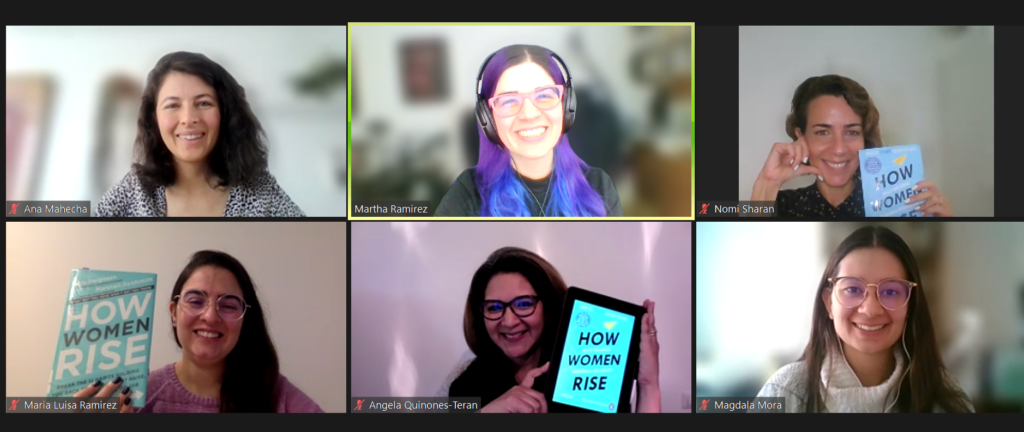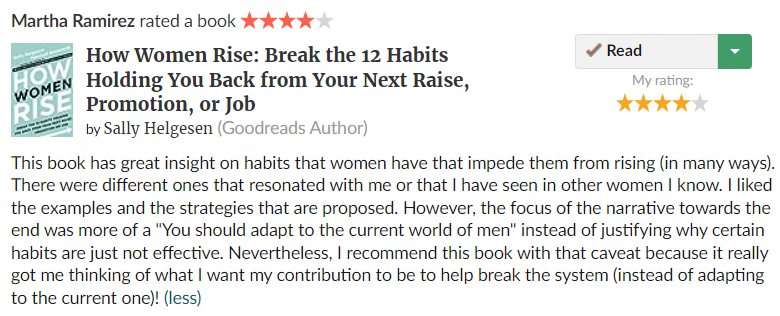Para leer este artículo en español, haz clic aquí.
In a world that has been led by a patriarchal structure, it is important to create spaces where both women and men in all their diversities can reflect on what gender inequality looks like as well as the pushbacks women in all their diversities are faced within their professional and personal lives. With this idea in mind, I decided to open a space for these conversations to take place and take up space while combining it with my passion for reading. The book we read and discussed is How Women Rise by Sally Helgesen and Marshall Goldsmith. So in this post, I want to summarize the insights from the book discussion, which has ignited meaningful conversations about the challenges faced by women in today’s society.
In this book discussion, six women participated and engaged in a thought-provoking conversation about the challenges we face in regards to the content of the book.

We talked about the impact of structural issues and societal expectations on women’s growth and success. We emphasized the significance of nurturing supportive environments that foster personal and professional development while shedding light on the detrimental effects of toxic and patriarchal company cultures.
One of the critical takeaways from our discussion was the recognition of implicit biases, not only held by men but also by other women. We uncovered how these biases influence the way women are expected to act, both in their personal lives and within the professional sphere. Throughout the conversation, we explored a multitude of topics, from the pressures of body image to the importance of women taking up space and expressing themselves authentically.
We examined the significance of body language, cultural practices, and social factors in perpetuating barriers for women. It was clear that these factors play a substantial role in shaping the experiences of women in various environments. We discussed the expectations placed on women and the challenges faced when expressing themselves, especially in group settings. The fear of being shut down or excluded often hinders women from speaking up and acting authentically. We mentioned how it is sometimes women who shut other women down when they are in the spotlight. We explored personal journeys towards becoming more assertive and confident, challenging the tendency to use phrases such as “I don’t know” or to speak indirectly. Our conversation even touched on the importance of pronouns “I” and “We” in communication, recognizing the the need to strike a balance between collective work”we” and individual identity “I” within a team setting, since there are cases where the main focus is on the “we” and the “I” gets lost along the way.
These were other ideas we discussed:
- There is pressure on women to make themselves smaller and take up less space; this includes losing weight, dressing in a way that makes them less noticeable, and being quiet.
- The struggle is real! Some of us struggle with acknowledging personal contributions in a group setting (imposter syndrome).
- We should embrace the idea of thanking ourselves first for our accomplishments.
- One of the “AHA” moments of the book was the realization that changing behavior often involves not doing certain actions (i.e. focusing on what one must not do instead of the must-dos)
- We questioned whether certain actions or behaviors that worked for us in the past still serve a purpose today.
- We expressed a desire for more explicit conversations about gender, along with the need to create spaces for discussion and amplification of voices in education and communication.
- We appreciate the strategies and ideas proposed in the book even though the narrative was more focused on adapting to a world of men.
Regarding the book, here is a short review I wrote:

As I conclude this post, I hope that this glimpse into this book discussion has inspired you to reflect on some of the ideas shared above. Your thoughts, suggestions, and stories are always welcome! Feel free to reach out and comment on this post.
Nice gathering and great topics to have long interesting conversations and to reflect on. I think that the idea of being pressed by the environment to take less spaces or be smaller depends on the countries they live in. Here in Argentina for example, we have made ourselves the space to rise and be listened to in many spheres, as for daily life, politics, sport, work, etc. However, there are still many societies that do not allow women to speak up. I think it´s our duty to help them with these spaces and actions, to speak out for them.:)
Thanks Viviana for sharing your insights and experience!